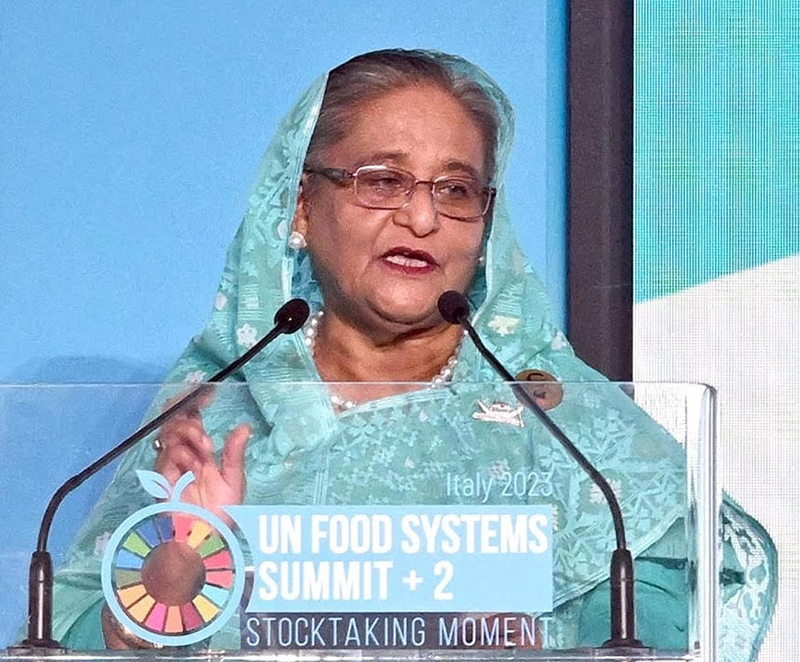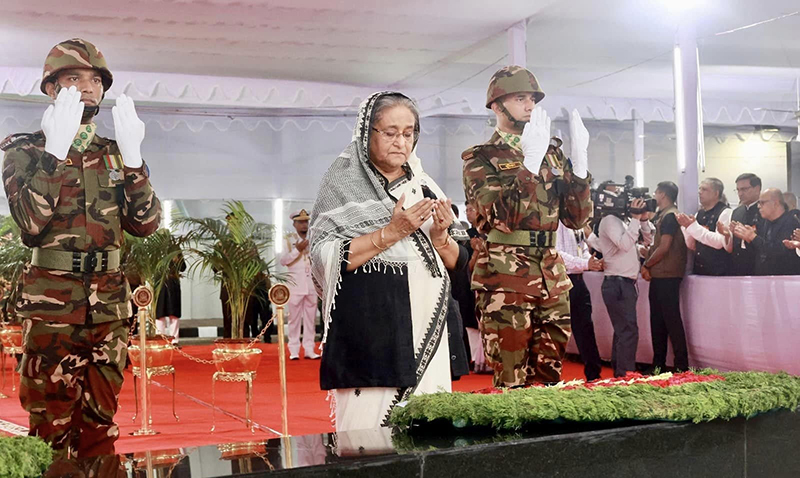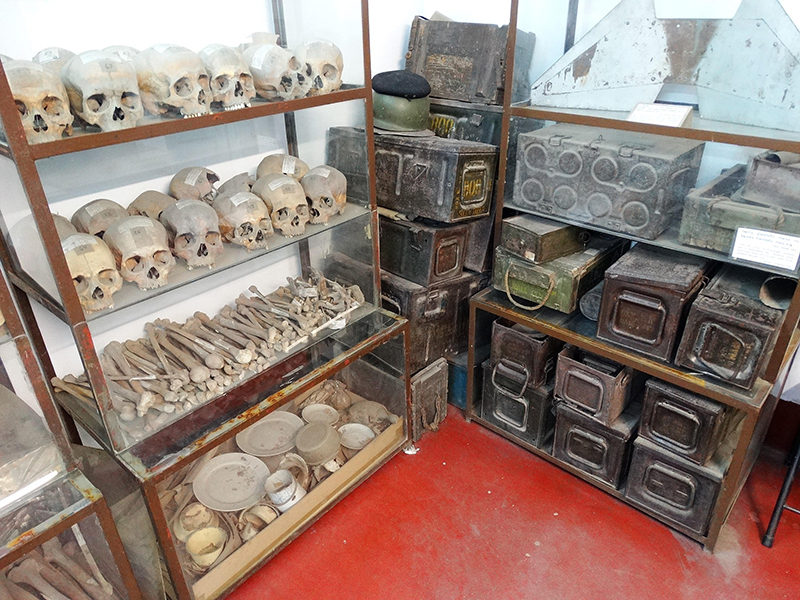USA's recent moves on Bangladesh will only strengthen Islamists & anti-liberation forces
The USA had announced that it will deny visas to any Bangladeshi involved in electoral “malpractices”. The moves by the USA have irked PM Sheikh Hasina whose party Awami League shares a difficult relationship with America since the 1971 war.

The then Nixon administration had backed the Pakistan Army which tried to suppress the freedom struggle led by Awami League. The USA still finds outlawed Jamaat-e-Islami as a moderate Islamic party while Jamaat’s track record is akin to radicals. It has often been accused of promoting terrorists and terror masterminds.
The 2001-06 rule by the BNP-Jamaat-e-Islami encouraged the Indian insurgents on Bangladesh territory besides cross-border terror by Islamists.
China and the BNP share decades old ties which deepened during the 2001-06 BNP rule. USA needs better sensitivity about the Indian subcontinent and by backing BNP and Jamaat-e-Islami, it is strengthening China’s outreach in South Asia.
In 2021 the sudden decision by the Biden administration to pull out from Afghanistan was a major setback to several countries in South and Central Asia. The US decision to exit Afghanistan after decades of trying to maintain a US friendly democratic government has not only let down the people of Afghanistan but jeopardized the whole security of the region.
Over the past few years several cross-border projects were launched across power, energy and connectivity sectors. India-Bangladesh defence partnership is being boosted and New Delhi airport is now a transshipment hub for Bangladeshi cargo. Line of Credit (LoC) extended to Bangladesh tops India’s list of LoC and Indian investments are on the rise.
India-Japan-Bangladesh has formed a trilateral for connecting Northeast to Bay of Bengal via Bangladesh. However, the Hasina government should do well by not falling into the trap of either China or Islamists.
 Photo courtesy: Bangladesh Foreign Ministry FB
Photo courtesy: Bangladesh Foreign Ministry FB
The Sheikh Hasina government while trying to create a modern Bangladesh is carrying a burden of history. The Liberation War in erstwhile East Pakistan marked by the horrific genocide committed by the Pakistani Army and razakars, or collaborators, is not acknowledged widely even to this date.
Bengalis of East Pakistan wanted to be heard, to be recognized as equal to the West Pakistani rulers. Instead, they were killed mercilessly in their sleep. On 25th March 1971, Yahya Khan's sidekick Tikka Khan mobilized death squads to initiate 'Operation Searchlight'. They killed 7000 Bengalis in a single night. From that day till the end of the Liberation War 1971, Pakistani soldiers raped more than 200,000 women and killed more than 3 million people.
Till date the society in Bangladesh has not come to terms with this as some of the anti-Liberation figures of then East Pakistan remain at large. International community has not recognized the genocide yet and entire episode gets subsumed into India-Pakistan war. The Sheikh Hasina government while taking laudable steps to set the record straight should walk the extra mile to bring perpetrators to justice.
The prime targets of Operation Searchlight were the Dhaka University teachers and students, the lifeblood of the resistance movement. The Pakistani army singled out those especially likely to join the resistance. In the next morning, bodies of young men would be found in fields, floating down rivers, or near army camps.
Anthony Mascarenhas, a Pakistan based journalist, who was the first to report about the Bengali genocide in international media, quoted a Pakistani army major telling him: "This is a war between the pure and the impure... The people here may have Muslim names and call themselves Muslims. But they are Hindu at heart. We are now sorting them out... Those who are left will be real Muslims. We will even teach them Urdu."
 Sheikh Hasina paying respects to the Father of the Nation Bangabandhu Sheikh Mujibur Rahman on Aug 15 marking the National Mourning Day. Photo courtesy: Awami League X
Sheikh Hasina paying respects to the Father of the Nation Bangabandhu Sheikh Mujibur Rahman on Aug 15 marking the National Mourning Day. Photo courtesy: Awami League X
The Hamoodur Rahman Commission's report is the most critical piece of evidence of the 1971 Bangladesh Genocide. This report found the Pakistani military deployed in East Pakistan guilty of widespread atrocities, serious acts of human rights violations, and other abuses of power. The then PM of Pakistan ZA Bhutto ordered to burn every copy of this report. These heinous crimes are yet to be universally recognised as genocide. Not recognising the events of 1971 as genocide will not just be severe injustice done to the memories of the victims of genocide, it will be an injustice done to history itself.
The Bangladesh genocide is considered to be the largest and longest since it covers the entire length of the nine-month long liberation war of Bangladesh. Ironically the Bangladesh genocide remains unrecognised while other genocides in Europe and Africa have been acknowledged. It is pity and matter of shame that the genocide which killed more than the holocaust and was aimed at changing ethnicity of a group is yet to be globally recognised.
 Human remains and war materiel from 1971 genocide in Liberation War Museum. Photo courtesy: Wikipedia Creative Commons
Human remains and war materiel from 1971 genocide in Liberation War Museum. Photo courtesy: Wikipedia Creative Commons
There is no doubt that the mass killing in Bangladesh was among the most carefully and centrally planned of modern genocides. A cabal of five Pakistani generals orchestrated the events: President Yahya Khan, General Tikka Khan, chief of staff General Pirzada, security chief General Umar Khan, and intelligence chief General Akbar Khan.
The genocide and gendercidal atrocities were also perpetrated by lower-ranking officers and ordinary soldiers. These “willing executioners” were fuelled by an abiding anti-Bengali racism, especially against the Hindu minority. “Bengalis were often compared with monkeys and chickens. Said Pakistan General Niazi, ‘It was a low lying land of low lying people.’
(Based in New Delhi, Anjan Roy is a keen observer of Bangladesh politics and society for several decades. The opinion expressed in the article is of the author.)
IBNS
Senior Staff Reporter at Northeast Herald, covering news from Tripura and Northeast India.
Related Articles

Over 3.75 crore voters to decide fate of 121 Bihar seats in first phase today
Patna/IBNS: Over 3.75 crore voters in Bihar will exercise their voting rights on Thursday (November 6) in the first phase of the Assembly election, covering 121 of the state’s 243 constituencies.

‘Money Heist’-inspired gang steals ₹150 crore in Delhi scam; calls themselves 'Professor', 'Amanda', and 'Freddy'
Inspired by Netflix’s hit thriller Money Heist, a gang in Delhi pulled off a massive online scam worth ₹150 crore, styling themselves after the show’s iconic characters, media reports said.

Mumbai BJP chief invokes ‘vote jihad’ after Zohran Mamdani’s New York mayoral victory
The historic mayoral victory of Zohran Mamdani, 34, the first South Asian, Muslim, and youngest in a century to lead New York City, is resonating across the globe in Mumbai, where civic elections are around the corner.

Celina Jaitly expresses gratitude as Delhi HC intervenes in her brother’s UAE detention case
New Delhi/IBNS: Actor Celina Jaitly has expressed heartfelt gratitude after the Delhi High Court issued a notice to the Ministry of External Affairs (MEA) in connection with her brother, Major (Retd.) Vikrant Kumar Jaitly, who has reportedly been in detention in the United Arab Emirates (UAE) since 2024.
Latest News

Over 3.75 crore voters to decide fate of 121 Bihar seats in first phase today

PM Modi honours Women’s World Cup champions at his New Delhi residence

‘From champions to NAMO’: Indian women’s cricket team’s special gift for PM Modi

From fireballs to a supermoon: November’s night sky promises a cosmic treat

